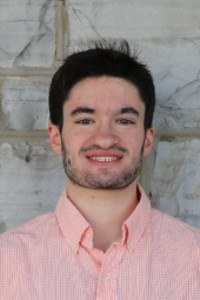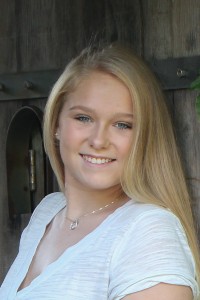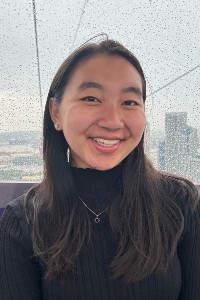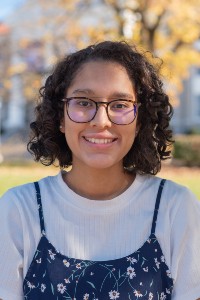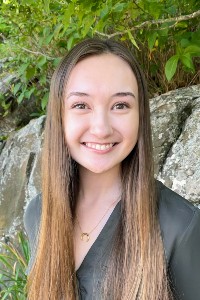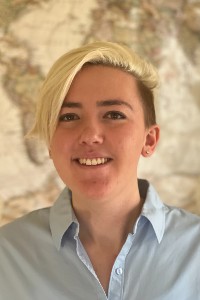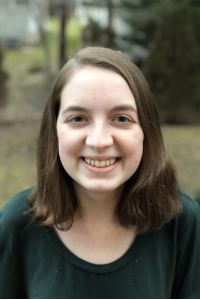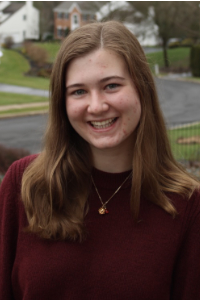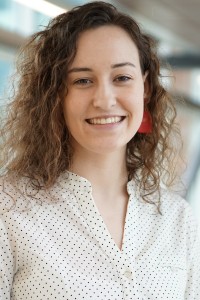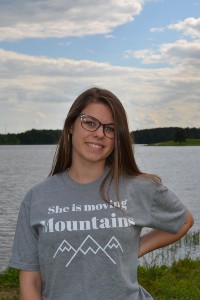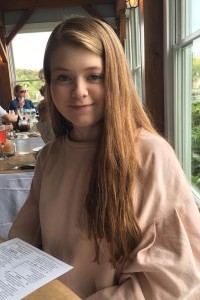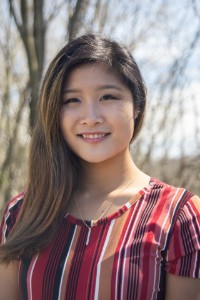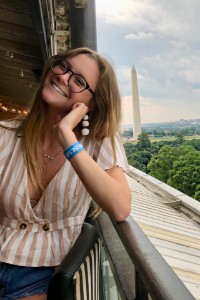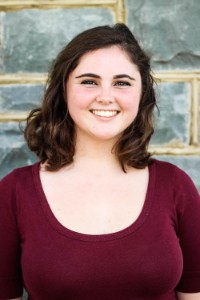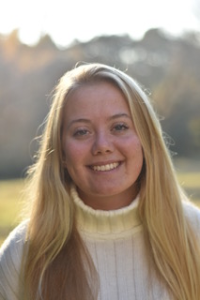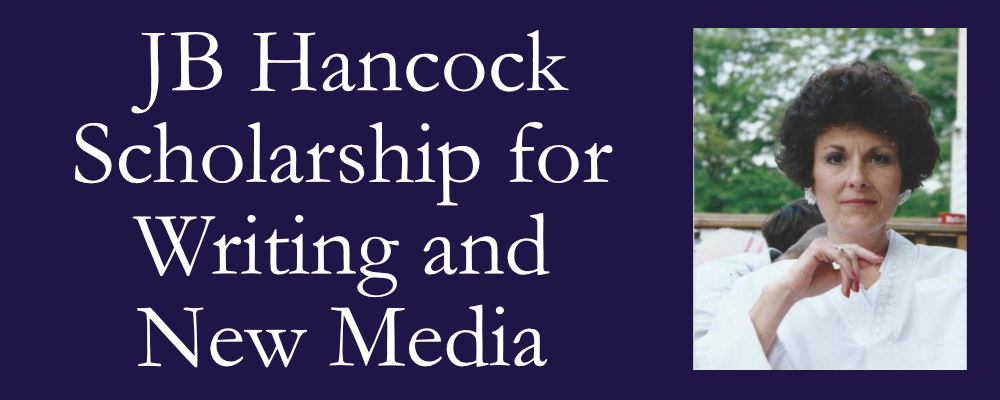
Scholarship Information
The JB Hancock Scholarship for Writing and New Media Communication was established in the summer of 2017 by a singularly remarkable woman who wished to create a scholarship to "encourage writing."
Ms. Hancock, a distinguished alumna of James Madison University, began her career in education and later established her own production company, JBH Productions, a multifaceted and multimodal start up: offering services in marketing, media and public relations, as well as professional and public affairs. Ms. Hancock continued her career in media as broadcast director for a large national non-profit association followed by a stint as communications director for a lobbying firm in Washington, D.C. During this time she was instrumental in establishing the National Association of Women Business Owners. Ms. Hancock was a lifelong learner, communicator and advocate. The JB Hancock Scholarship reflects and recognizes this spirit in the work of those students who receive this award.
The JB Hancock Scholarship will award at least $1,000 annually to one or more WRTC majors who have created a compelling piece of writing or new media communication that demonstrates both the importance of and excellence in connecting with audiences and communicating clearly and responsibly in a manner that is factual and persuasive.
The scholarship committee invites submissions in a variety of modes (print, digital, multimodal, video) that align with the spirit of this award. Submissions do not have to have been produced as part of an academic course. Collaborative submissions are also welcomed.
The scholarship is open to all returning full- or part-time WRTC majors who will remain enrolled as JMU undergraduate students in the following fall semester. This scholarship is not renewable and once a student has been awarded this scholarship, they are not eligible to receive it again. The Scholarship Selection Committee can consider only one piece from any student in any academic year. The scholarship is applied to tuition. Please go to the Cost of Attendance Calculator to see the estimated cost of attendance for your program of study.
Applying for the JB Hancock Scholarship
JB Hancock Scholarship applicants must use the Madison Scholarships Hub to submit their work for consideration. The Madison Scholarship Hub begins accepting JB Hancock Scholarship submissions on January 1, and the submission window will remain open through early March each year. More information about the Hub and the steps you'll need to work through is available below.
Complete applications for the JB Hancock Scholarship will feature two components:
- Your submission of a compelling piece of writing or new media communication that demonstrates both the importance of and excellence in connecting with audiences and communicating clearly and responsibly in a manner that is factual and persuasive. The scholarship committee invites submissions in a variety of modes (print, digital, multimodal, video) that align with the spirit of this award. Submissions do not have to have been produced as part of an academic course. Collaborative submissions are also welcomed.
- Your response to the following short essay prompt: How does this submission address the spirit of the JB Hancock award: as demonstrating both the importance of and excellence in reaching out to audiences and communicating clearly and responsibly as well as factually and persuasively? Address such elements as context, exigency and genre as well as the effectiveness and impact of the piece on its intended audience(s).
How to Submit through the Madison Scholarships Hub
To access the Madison Scholarships Hub, sign into your MyMadison account. In your Student tab, click on the Madison Scholarships Hub logo.
- Complete the Hub's quick "General Application" form.
- After you submit your General Application, the Hub will offer a "Recommended Opportunities" page that should include the JB Hancock Scholarship for Writing and New Media. If you do not see the JB Hancock Scholarship in your list of recommended opportunities, click on the "Opportunities" tab, choose "Ours," and type "JB Hancock" into the Keywords text box.
- You can upload your submission (either your text or a document with a link or links) and your essay just like you would upload a file into Canvas or attach a file to an email. Complete your submission by clicking on the "Apply" button in the bottom right corner of the page.
If you have questions, please contact Michael Smith at smithmx@jmu.edu.
JB Hancock Scholarship Recipients
WRTC is honored to invite submissions at the beginning of each spring semester. Scholarship recipients are announced at the annual WRTC Awards Ceremony and Reception.
2023-2024
|
Lorenzo Salas ('25) |
|
Lorenzo’s “Coalition on campus for Palestine: Nonprofit group on campus forms with plans to educate and inform” was published in The Breeze in January. The article documents the efforts of a newly formed group of students and residents as they urged the Harrisonburg City Council to pass a resolution in favor of a ceasefire. It is a measured, clear, and thorough piece of objective reporting. |
|
Kailyn Hardy ('25) |
|
Kailyn’s research report measures the impact of the debilitating neurogenerative disease Amyotrophic Lateral Sclerosis (ALS) on families. The piece blends Kailyn’s personal narrative and scientific elements. It places her individual perspective and her family’s experiences within (and between) the context of medical information and research to both educate and connect to an audience on an emotional level. |
2022-2023
|
Grant Johnson ('24) |
|
Grant's "'Struggling in Silence': Following Student-Athlete Suicides, Answers Remain Difficult" Breeze article examines the often unrealistic expectations student-athletes face in and out of their sports. His article brings together the voices of student-athletes, psychologists, family members, college administrators, and coaches to examine the mental health challenges faced by those who often feel they must simply tough it out. |
|
Allie Etheridge ('24) |
|
Allie's Live Sustainably website is dedicated to sustainability issues in the music industry. Focusing on concerts and festival sites, she offers researched articles and blog posts examining trash and carbon emissions. Her work connects an easily overlooked issue with a much larger, ethical concern about global sustainability.
|
|
Anna Pompanio-Alt ('24) |
|
Anna's “Circle of Poison: The Impact Pesticides Have on a Person’s Health from an Environmental Health Rhetoric Perspective” surveys research from a range of fields, communicating complex information in a clean, clear, unsparing style. In doing so, her essay offers a powerful message about public health and the environment.
|
2021 - 2022
|
Fabiola Garcia ('23) |
|
Fabi’s Yunni journal features six profile pieces by university students (including herself) from across the United States. Composed amid COVID-19 and the Black Lives Matter movement, Yunni affirms its subjects' lives, paths, and experiences as it reminds readers of their place in the human community.
|
|
Emily Daggett ('23) |
|
Emily’s project titled "Improving Financial Well-being in the United States" weaves graphs, tables, and story to explore the definition of financial well-being, analyze the financial state of U.S. households, and recommend ways to create a more inclusive and effective banking system. |
|
Sophie Edlich ('23) |
|
Sophie’s website titled "Artifiicial Intelligence or Artificial Prejudice?" examines how AI is being used in hiring processes and how it perpetuates (rather than alleviates) bias. |
2020 - 2021
|
Sarah Foster ('22) |
|
Sarah’s project, two episodes from her podcast Culture Goblins, focuses on re-emerging cultural phenomena – Dungeons and Dragons (D&D) and musical theater – to explore the ways that media can connect audience members not only to compelling and interesting content, but also to each other. Her work disrupts the line-drawing that can happen around lesser-known, niche interests and instead emphasizes community, accessibility, and connection through the history and human stories that inform them. |
|
Katherine Peppiatt ('23) |
|
Katherine’s project, “Grandmother to Granddaughter: What’s Changed,” is made up of three nonfiction stories shared via website to amplify the voices of young women struggling to find their place in the world. Her work pinpoints how gender inequality remains a prevalent issue across three generations and serves as a call to action to address the challenges that women continue to face. |
2019 - 2020
|
Leah Smith ('21) |
|
Leah’s black and white Adobe Spark photo essay Chronic Pain: A Visual Representation powerfully and poignantly shares the difficulties of communicating an invisible (and as yet unnamed) health condition to others. She writes on her body to make her pain visible, and in the process, she makes her immense strength visible as well. |
|
Katelyn LaScola ('22) |
|
Katelyn’s blog, titled She’s Moving Mountains, is dedicated to eliminating the loneliness around mental health issues and college life. In it, she shares her stories alongside the stories of others in an effort to de-stigmatize and to open up the conversation. |
|
Meghan Long ('21) |
|
Meghan’s project, an Adobe Spark story titled Falling in Love with Writing: Lessons from my Dad, is a powerful story of influence, one that illustrates the power of a single story to reach out on a more universal, human level. |
2018 - 2019
|
Kailey Cheng ('21) |
|
Kailey's article JMU Professor Uses Experience to Inspire Kids to Become Artists written for The Breeze offers voice to marginalized populations in an ethical, honest, and purposeful way. |
|
Lexie VanKirk ('21) |
|
Lexie's project Becoming a Successful Instagram Influencer focuses on best practices in becoming such an influencer. The piece's entrepreneurial focus, squarely rooted in an understanding of the responsibilities such an influence places on the creator of the messaging made it stand out. |
2017 - 2018
|
|
|
Teresa's project Writing on the Interdisciplinary Team: Bridging Communication Amidst Collaboration is a sophisticated mix of her work as a technical communicator on three interdisciplinary projects, including a study abroad community project (Ireland: From Water to STEAM) and the WRTC 328: Hacking 4 Defense, Digital Overlay project. Using a digital story and a website, she provided samples of her work along with a brilliant meta-analysis of their context and importance. |
|
|
|
Caroline's project Drone Missile Strike Policy in the United States and the Case of Faheem Qureshi focuses on the importance of secondary research, particularly the power of personal narrative in an investigative piece to humanize data. |



